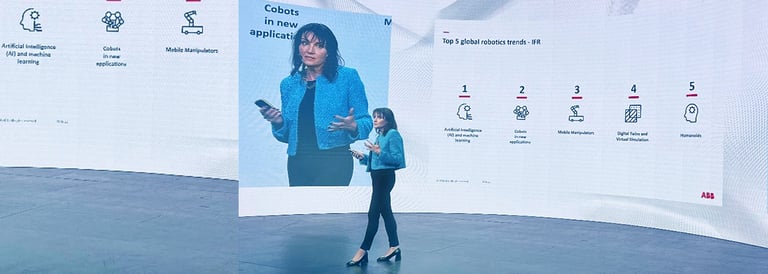Exploring Trends in Industrial Automation: An Interview with Marina Bill

With over 27 years at ABB and a pivotal role on the board of Piab Group, Marina Bill stands at the forefront of technological innovation. In a conversation with Isabel Furtenbach, she shared her insights on the trends shaping the industry and the future of automation.
Marina's journey began in Sweden, where she studied at the Royal Institute of Technology (KTH). Her career launched at Vattenfall, exploring the intersection of technology and economics. Seeking a global perspective, she joined ABB, spending nearly three decades navigating sectors from SCADA systems to robotics. Her expertise in robotics and automation naturally aligns with Piab Group's focus on vacuum technology and industrial automation solutions, reinforcing their shared vision for innovation.
The driving forces of automation
During the interview, Marina highlighted four macro trends propelling the automation industry:
- Labor shortage: The global scarcity of skilled workers, such as welders, drives automation. Industries must automate tasks lacking human labor to maintain operational continuity.
- Personalization: Post-COVID, the demand for customized products has surged, necessitating flexible production systems. Robots are crucial in meeting this demand by enabling adaptable manufacturing processes.
- Mission-critical production: In an unpredictable world, resilient production systems are essential. Automation ensures that vital manufacturing continues uninterrupted despite external disruptions.
- Digitalization: Integrating digital technologies enhances automation capabilities, contributing to a more sustainable future.
Marina also discussed specific strategies and technologies shaping the industry:
- Artificial Intelligence: AI plays a transformative role in robotics, particularly in enhancing Piab Group's gripper technology to efficiently handle unfamiliar objects. AI-driven quality control systems are revolutionizing precision-dependent industries like welding.
- Mobile manipulators: These robots, equipped with mobility, enhance flexible production capabilities, particularly in logistics.
- Digital twins: Virtual replicas of physical systems that enhance design and operational efficiency in factories.
- Cobots (collaborative robots): Robots designed to work alongside humans, expanding automation into small and medium-sized enterprises.
- Humanoids: While the Humanoid robotics is attracting funding and research in software and hardware aspects of robotics and artificial intelligence which benefits all areas of robotic automation, we believe that fully human-like and commercially viable humanoid robots remain far from commercialization. To mimic the full spectrum of human movement, skill, and sensory perception demands not only technological innovation but also a deeper understanding of human biology and cognition.
Collaboration: the key to innovation
Marina emphasizes collaboration as a driver of innovation. She notes that industries embracing co-creation – partnering with customers, integrators, and educational institutions – lead in technological advancement. This approach accelerates innovation, breaking down silos and fostering creativity.
Piab Group's path forward
Reflecting on Piab Group's journey, Marina praises the company's commitment to innovation. Strategic mergers and acquisitions have bolstered its technological prowess, while a focus on commercial innovation enhances customer interactions and internal processes. Marina envisions Piab Group continuing to thrive as a technology-driven leader.
A vision for a sustainable future
Looking ahead, Marina sees automation playing a pivotal role in sustainable development. By reducing waste and optimizing energy use, automation contributes to a more sustainable society. She also advocates for greater gender diversity in the robotics field, envisioning an inclusive industry enriched by diverse perspectives that drive innovation and growth.
As Marina shares her insights on the future of robotics and automation, her vision is one of collaboration, innovation, and sustainability – a future where technology amplifies human potential and drives positive change.